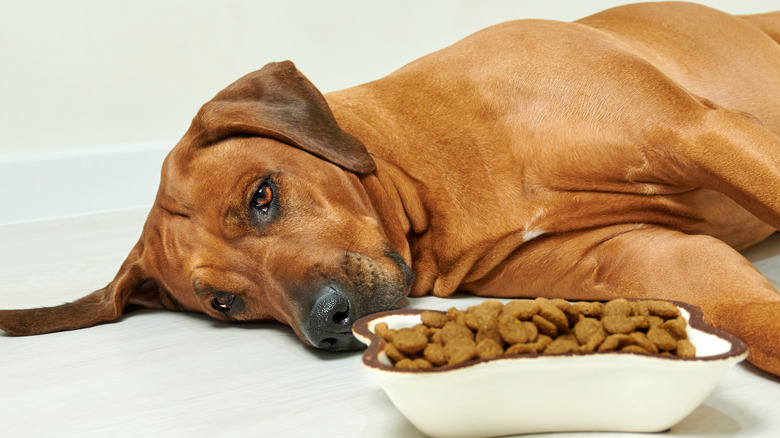What Happens To Your Pet When It Has An Allergic Reaction To Food
One of the most important duties of being a pet owner is keeping our pets safe and healthy. We research and pick the best food we can find, schedule regular vet check-ups, and give them lots of cuddles and hugs. Yet, sometimes we notice our furry friend is acting a little strange and can't figure out why. That may actually be one of the signs that they aren't feeling well. "Dogs and cats can't tell us when something hurts or doesn't feel good. But the owners that see them every day will realize when they're not just being their regular selves," explains veterinarian Dr. Mark Stickney, via WebMD. "Any change in your pet's behavior from what it normally does is a reason to see your veterinarian."
According to Vetstreet, things to look out for include: how they are eating and drinking, peeing and pooping, and whether they are coughing or vomiting. So how does an animal owner tell if their pet is really sick, or if they may have a food allergy?
Food allergy symptoms in cats may be subtle
When your pet ingests an allergen, their body becomes hypersensitive to that food, which results in the immune system overreacting and producing symptoms. Typical reactions in cats and dogs include vomiting, diarrhea, and itchy paws and skin, via VCA Animal Hospitals. Other signs are much less noticeable, and you might not connect them with a food allergy, including aggression, hyperactivity, fatigue, and weight loss.
Food allergies are the third most common allergy in cats, according to MissionVet, right below reactions to fleas and environmental allergens.
Though cat food allergies may go unnoticed longer because cats are highly independent and keep to themselves more than dogs, where your cat may be itchy can be a clue. "The itching eruptions primarily affect the head and neck area," explains Carolyn McDaniel, VMD, per Cornell University College of Veterinary Medicine. "They're not always in that area, but often enough to serve as a clue that the source is a food allergy."
Dogs' food allergy symptoms are similar to humans
In dogs, when food is causing an allergic reaction, besides the usual gastrointestinal symptoms and relenting itchiness, you may also notice allergy symptoms similar to what we might have — such as sneezing and runny, watery eyes, according to the American Kennel Club. They may also have crusty and flaky skin, itchy ears, and fur loss. If your dog has recurrent ear infections, ask your vet about allergies. The most common allergy culprits are proteins such as egg, dairy, chicken, beef, or soy. Typically, an allergy will produce symptoms within 6-24 hours of ingesting the food.
However, the confusing part about food allergies in dogs is that they may have been eating the food for a long time and been completely fine — but then they seemingly have an overnight allergic response to it, per The Spruce Pets. That happens because it takes prolonged exposure for the dog's body to build an allergy and produce a hypersensitive immune overreaction.
If your cat or dog is itchy, has gastrointestinal issues, or is just plain acting out of sorts, it may be a sign your pet needs a visit to the vet. Although food allergies may be the cause, there could be other underlying conditions.


